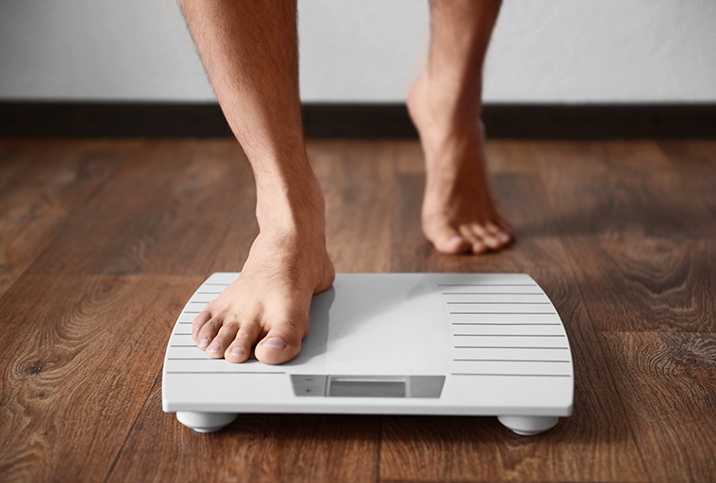Bariatric Weight Loss Surgery Could Yield Sexual Health Benefits

The links between sexual health issues and obesity are well chronicled, but identifying the correlation is only the first step in working toward a solution. Methods for dealing with obesity are numerous. The most common approaches, of course, are to eat a healthy diet and exercise regularly. Yet no two people are entirely alike, and methods that may work for one person might not work for another.
In instances where diet, exercise and other noninvasive interventions don't work, certain medical procedures, such as bariatric weight loss surgery, can be a boon for people looking to get their health back on track. Moreover, the minimally invasive surgery could help restore some sexual function that might have been lost as weight became more of an issue.
Historically, the medical community has used body mass index (BMI) as a qualifying measurement for bariatric surgery procedures. BMI, a measure of body fat based on weight and height, has its detractors and was never intended to be an accurate predictor of health, but it is used nonetheless. The index says individuals with a BMI of 30 or higher are considered obese, and individuals with a BMI of 35 or higher run the risk of "severe" obesity.
At that point, many health complications can come into play.
What is bariatric surgery?
Bariatric surgery is a minimally invasive operation in which a surgeon performs one of two procedures: gastric bypass surgery or laparoscopic surgery.
Each of these surgeries is meant to reduce the overall calories a person consumes by altering the size and shape of their stomach, according to George Eid, M.D., a surgeon who specializes in minimally invasive general procedures at Allegheny Health Network in Pittsburgh.
During gastric bypass, a patient's stomach stays generally the same, but a smaller stomach is "carved out" of the existing stomach. The intestines are rerouted so only a portion of the food a patient eats is actually absorbed, broken down and converted into calories.
Laparoscopic surgery, on the other hand, involves a surgeon actually altering the shape of a person's stomach. They remove roughly two-thirds of the organ and leave what Eid called a "skinny banana." By decreasing the size of a patient's stomach, surgeons are able to prevent that patient from overeating. Eventually, this procedure can also alter the hormones that cause a person to feel hungry.
Originally, bariatric surgery was reserved for patients with a BMI of 40 or higher—officially classified as "severe" obesity, Eid explained. Patients with a BMI of 35 to 40 qualified if they had preexisting health conditions, such as diabetes.
Those thresholds were set in 1991. Since then, more and more doctors have performed the procedure and gained a better understanding of how it can help patients, which has led to a change in qualification requirements. Now, patients with a BMI of 35 or higher—30 to 35 with preexisting conditions—can request bariatric surgery.
How does bariatric surgery benefit patients?
In simple terms, Eid likened patients' ongoing struggle with losing weight to a game of tug-of-war.
On one side of the rope, you have the patient. If they are eating healthy and exercising, those are two more players on their side. But the other side of the rope has team members like "junk food" and "sitting around all day." Additionally, a number of genetic, lifestyle, hormonal and metabolic factors are all pulling against the patient's side. So even with a good diet and exercise, they are still outnumbered.
Bariatric surgery eliminates some of the players on the other team, Eid explained.
Sexual side effects of obesity and how bariatric surgery can help
Obese patients often find short-term success in keeping their weight off. Many of the strategies they employ work only for a brief period, however, and then those unhealthy factors come back into play. By removing some of those opposing "players," bariatric surgery makes the fight much fairer.
For example, a change in diet might simply slow down someone's metabolism, meaning that six months later, they're putting on weight again. This could be especially frustrating for a patient struggling with sexual issues, since those complications could come and go with their fluctuations in weight.
Obese men frequently struggle with erectile dysfunction (ED), but ED is a multilevel process that can't be attributed solely to a person's weight, said Ramy Abou Ghayda, M.D., a urologist and men's health specialist at University Hospitals in Ashland, Ohio.
"However, if you can control the modifiable risk factor, like lifestyle, weight, smoking, drinking and obesity, this will correlate positively with ED outcomes," he said.
One way in which obesity can impact a man's sexual function is by changing how the body processes estrogen and testosterone, Ghayda explained.
"The fat cells in your body will transform testosterone to estrogen," he said. "So when—and this is a very tight equilibrium in the body—when you have more fat cells, this conversion from testosterone to estrogen is going to be more pronounced. Then these patients would have a higher estrogen level compared to their testosterone level."
Testosterone is the main sex hormone in men, therefore, it plays a significant role in libido and sexual function. If a man's testosterone levels dip and his estrogen levels rise, he'll also likely see an increase in sexual dysfunction.
"When people actually lose some weight via bariatric surgery, they will lose some fat cells," Ghayda said. "And there is a higher chance that the testosterone-to-estrogen ratio would equilibrate, or go back to near-normal levels, which will contribute positively to erection and libido."
There are also numerous cardiovascular issues that can arise as a result of obesity. Erectile dysfunction can often be a precursor to some of these heart issues, Ghayda explained. The blood vessels in the penis are smaller than those in the heart, and disruption to that blood flow could indicate problems elsewhere.
Ultimately, it's important to keep in mind that sexual health is often closely related to physical health. Bariatric surgery is a valuable tool for obese patients looking to improve all aspects of their health, and it can be especially useful as a method of restoring and improving sexual function.
If lifestyle changes and bariatric surgery improve your overall health but erectile dysfunction persists, a wearable device free of the side effects of medication can restore sexual function. Eddie® is an FDA-registered Class II medical device designed to treat ED and improve male sexual performance. Its oval shape and fast-acting results allow you to treat your ED with more control. With Eddie, you don't need to wait for a pill to kick in or use an awkward pump. And it was shown, in 2021 clinical trials, to be effective in treating men with physically, psychologically and pharmacologically induced ED.


















